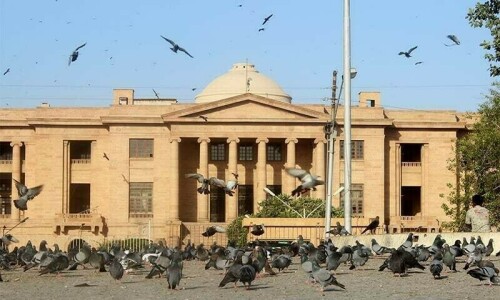ISLAMABAD: The tussle over who should be working as the top police officer of Sindh deepened on Thursday when the Supreme Court issued a directive, effectively nullifying a recent decision of the federal cabinet under which A.D. Khowaja had been removed from the key post.
Mr Khowaja, much to the consternation of the Sindh government, will continue to serve as Inspector General of Police with full powers of making transfers and postings until the apex court decides the provincial government’s appeal against his retention as top cop.
A three-judge SC bench headed by Chief Justice Mian Saqib Nisar had taken up the provincial government’s challenge to the Sindh High Court’s Sept 7, 2017 verdict in which the former was restrained from appointing, removing, transferring or posting the IGP. The Sindh government wanted to replace Mr Khowaja with Abdul Majeed Dasti — a grade 22 officer — and the federal cabinet had on Jan 10 approved Mr Dasti’s appointment.
On a petition moved by an NGO, Shehri, Citizens for a Better Environment (CBE), the high court had ordered Mr Khowaja to continue as IGP till completion of his three-year tenure.
The Supreme Court, while admitting for hearing the appeal of the Sindh government, directed the federal government not to take any action regarding change of police chief in the province until the case is concluded. The court also cautioned that any order by the Centre or the provincial government to change the police officer in the meanwhile would be considered suspended.
Farooq Naek argues duration of IGP’s tenure is purely a matter of policy that cannot be interfered with by court
Senior counsel Farooq H. Naek, who represented the Sindh government, argued before the apex court that the high court had given ample authority to Mr Khowaja of transfer and posting which was not even asked for.
In its appeal, the provincial government pleaded that it was facing severe hardship in performing its constitutional obligation of maintaining law and order and unless the present petition was allowed, the public interest would be seriously prejudiced and its authority and autonomy undermined.
“The legislative bodies cannot be prevented or restrained from performing their constitutional obligations and carrying out their mandate, as exclusively conferred upon them,” the appeal argued, adding that the high court had restrained the provincial government in perpetuity from reducing the term of IG Sindh to less than three years.
“Such finding is arbitrary as it is not supported by any reasoning whatsoever in the body of the impugned judgement,” the petition contended, adding that restraining the provincial government from altering subordinate legislation issued by itself amounted to a permanent injunction against a legislature from performing its constitutional duty.
By virtue of this permanent injunction, the appeal regretted, the high court had not just prevented the incumbent provincial government from making an amendment to the Rules of Business, but also bound, in perpetuity, all future and successive governments i.e. de facto legislatures of subordinate legislature from making any such alteration.
“It is beyond comprehension how the high court reached a conclusion that a bare minimum tenure of three years is to be guaranteed as an inviolable obligation and the same can never be reduced,” the appeal wondered.
It said the determination of three-year tenure of the IGP to be immutable by the province was thus tantamount to writing into the Constitution which was blatantly illegal, unlawful and outside the jurisdiction of the high court.
The entrenchment of three-year duration of tenure of the IGP was never contemplated by the Constitution, federal or the provincial legislature as such, the entrenchment was illegal, unconstitutional and blatantly without jurisdiction, the appeal contended.
“The duration of tenure is purely a matter of policy and the same cannot be interfered with by the court being non-justifiable, and to this extent the law laid down in the 2013 Anita Turab case does not relate to change of the tenure by an amendment to the law or rules itself but only seeks strict adherence of that tenure which is prescribed in the law,” it said.
The appeal emphasised that the high court itself had irrationally fixed an inviolable term of three years for the tenure of IGP which was not sustainable, particularly in the absence of constitutional protection of such tenure to such post, nor any finding or declaration given by the court as to any lesser term resulting in an automatic violation of fundamental rights of the citizens at large.
Published in Dawn, January 19th, 2018











































Dear visitor, the comments section is undergoing an overhaul and will return soon.